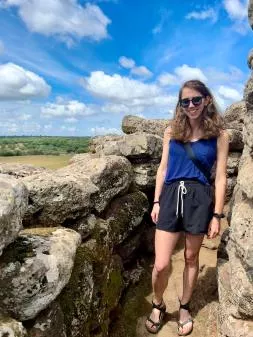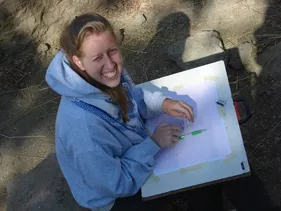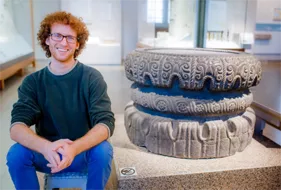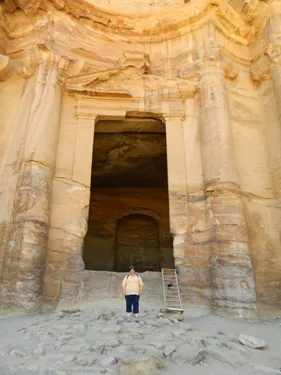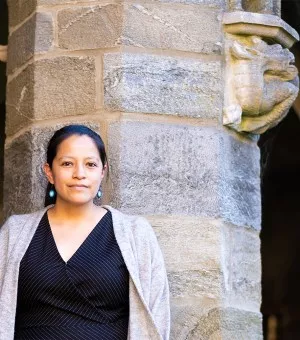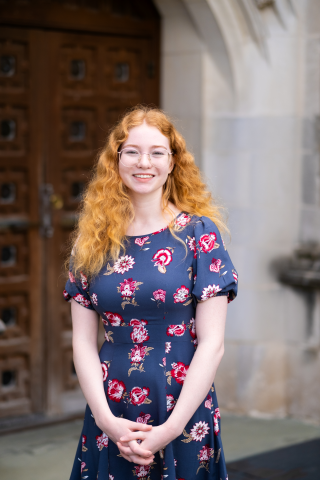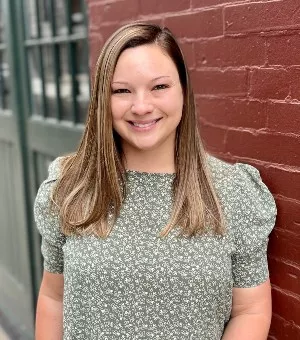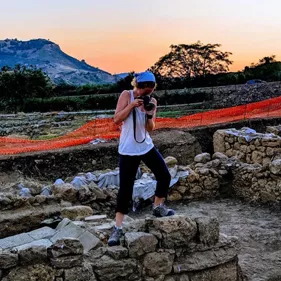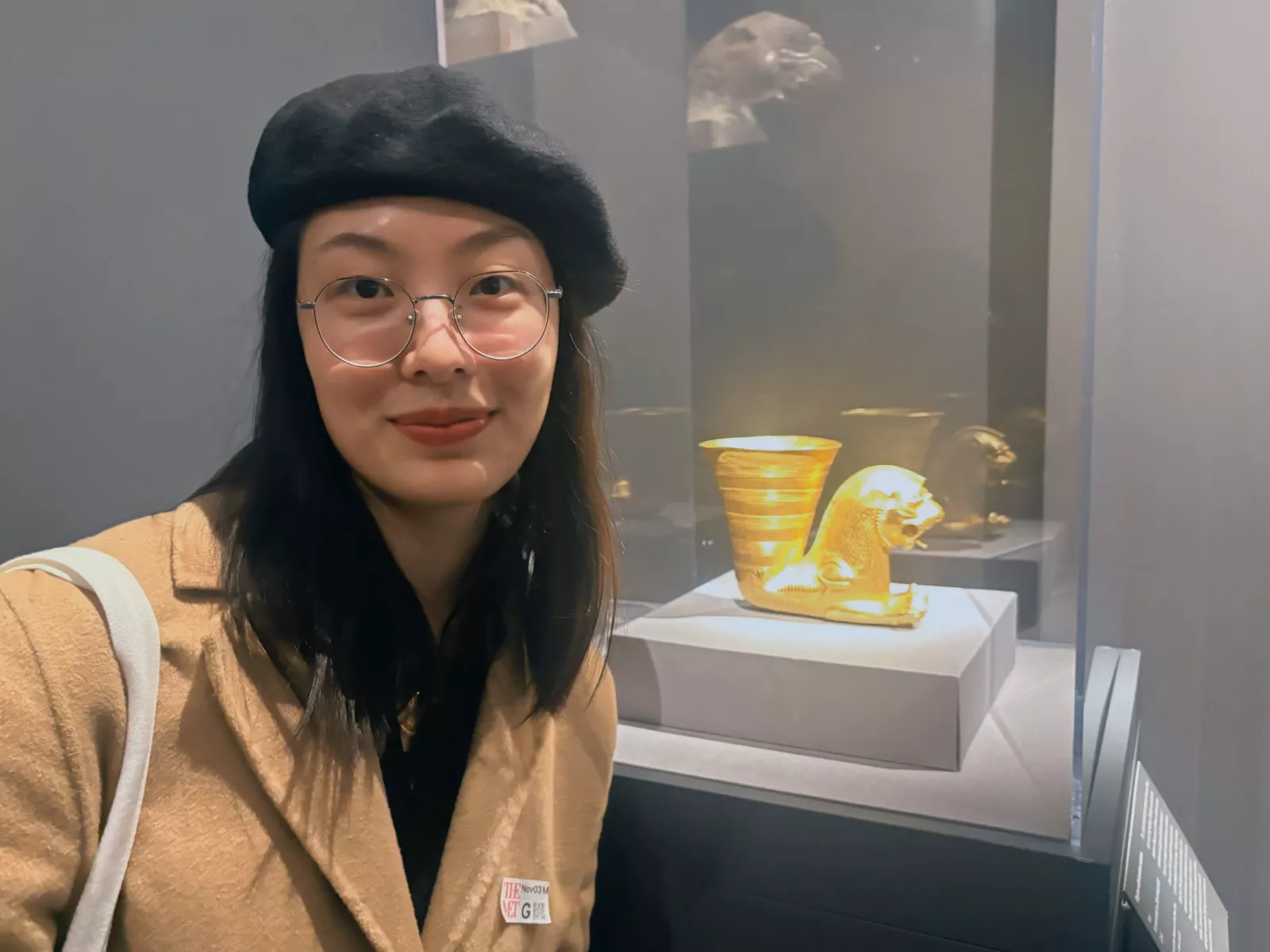Current Grad Students in Archaeology
Cem Almurat
calmurat[at]brynmawr.edu
Cem Almurat is an M.A. Candidate in the Department of Classical and Near Eastern Archaeology. He received his B.A. in 2021 and M.A. in 2024 with his thesis titled "The Emergence of Roman Urbanism in the Central Anatolian Plateau" from Boğaziçi University History Department, Istanbul, Turkey. His archaeological fieldwork has been concentrated in Turkey: He has been a long-term member of Boğaziçi University Tarsus-Gözlükule Excavations as a trench supervisor, Istanbul Küçükçekmece-Firuzköy Excavations with the German Archaeological Institute in Istanbul's team, and the North Ankara Archaeological Field Survey project by Ankara University.
His research primarily focuses on the gradual development of urban armature in Roman-era settlements in Anatolia, with a particular focus on the impact of environmental differences and reciprocal relationships between urban centers and their hinterland/countryside through the circulation and consumption of certain goods and the formation of supply chains.
Olivia Angsten
Olivia Angsten is an MA candidate in the Department of Classical and Near Eastern Archaeology. She received her B.A. in Archaeology from Cornell University in 2018 and her M.A. in Classics from Stanford University in 2021, before working in Cultural Resource Management in her home state of Florida. She has excavated in both Italy and Greece, and she has been a part of the Casa della Regina Carolina Project at Pompeii since 2019. Though her primary interest is in Hellenistic Egypt, her current research focuses on ancient Greco-Roman magic and the body.
Flora Arnsberger
Flora Arnsberger is an M.A. Candidate in the Department of Classical and Near Eastern Archaeology. They received their B.A. with Latin Honors in Art History with a minor in Archaeology from Smith College in 2023, with independent research concerning Tanagra-style figurines in the Smith College Museum of Art collections. Their research interests include funerary ritual and grave goods across the pre-Hellenistic Mediterranean, and Etruscan ceramics. They have excavated in Italy and Cyprus.
Katie Breyer
Katie Breyer is a Ph.D. candidate in the Department of Classical and Near Eastern Archaeology. She received her B.A. in both Archaeology and Classical Civilizations from the University of Cincinnati in 2018 and her M.A. from Bryn Mawr College in 2020. Her M.A. thesis focused on the transformation of Naqš-e Rostam from a royal, Achaemenid necropolis into a Sasanian political landscape. She has previously excavated at Morgantina in Sicily, the Vagnari Cemetery in southern Italy, worked with a small finds team at Pompeii, and most recently worked with the Sinus Archaeological Survey and the S’Urachi Project in western Sardinia. Her main interests are in spatial and landscape archaeology, settlement patterns, the construction of power and identity, and post-colonial approaches to the Roman empire. Her dissertation, focused in Sardinia, explores the changes to the rural landscape during the Punic and Roman periods through the lens of ritual and religious practices. kbreyer@brynmawr.edu
Tracey Cian
Tracey is a Ph.D. candidate in the Department of Classical and Near Eastern Archaeology. She obtained her B.A. in Heritage Studies at the University of Pisa in 2010, focusing her research on Egyptology and Near Eastern studies. She subsequently graduated from University College of London in Qatar in 2015 with an M.A. in Archaeology of the Arab and Islamic World, and in 2019 she received her second M.A. in Classical and Near Eastern Archaeology from Bryn Mawr College. She has previously worked on excavations and surveys in Italy, Greece, Oman, northern Lebanon, and Qatar. Most recently, she returned to the field to work on two early Islamic sites in northern Qatar, while this year she participated in the excavation of a Bronze Age site, which was led by the German Archaeological Institute, in north-western Saudi Arabia .
Her research primarily focuses on the societal interactions within the Arabian Peninsula and in the larger SWANA region, and on the ritual features of the Arabian Peninsula during the Bronze Age and Iron Age. However, her research interests also include analysing Late Islamic ceramics from the Gulf, trading connections between the Gulf, the SWANA region and the Far East, and Ancient South Arabian epigraphy.
Jeff Cumonow
Jeff Cumonow is a Ph.D. candidate in the Department of Classical and Near Eastern Archaeology. He received his B.A. in History and Anthropology at Eckerd College in 2013. He subsequently graduated from The University of Chicago in 2019 with an M.A. in Middle Eastern Studies with a focus in Near Eastern History and Late Antique-Early Islamic Archaeology. He received his second M.A. in Classical and Near Eastern Archaeology from Bryn Mawr College in 2022. He has previously been employed as a conservator and archaeologist for cultural ministries in the southern Levant and as Head of Museum Archives at the Institute for the Study of Ancient Cultures, University of Chicago. He has worked at numerous locations across the Mediterranean, including Cyprus, Turkey, Spain, and the Southern Levant. Sites he has led excavations at include the large Late Bronze-Early Iron Age settlements of Tel Keisan, Zincirli Höyük, Idalion, and Cerro del Villar.
Jeff’s dissertation explores the archaeology of Late Bronze and Early Iron Age landscapes in the southern Levant. His work focuses on change, continuity and large-scale transitions of settlement patterns, and in examining how these appear in optimal and sub-optimal regions and in rural and urban locales. His additional research interests are in cultures of the Late Bronze and Early Iron Age eastern Mediterranean, spolia and reuse, and Late Antique and Early Islamic urban morphology and architecture.
Daniel D'Elia
Daniel D'Elia is a Ph.D. student in the Department of Classical and Near Eastern Archaeology. He received his B.A. in Classical and Near Eastern Archaeology with a Minor in Physics at Bryn Mawr College in 2022 and his M.A. in Classical and Near Eastern Archaeology at Bryn Mawr in 2023 with the thesis, "Chian Mastic: A Reconsideration of Recent Chemical Studies and a Diachronic Survey of Ancient Greek References to Mastic and its Natural Products." Daniel has excavated in the United States, Romania, and Greece, and has most recently participated as an assistant supervisor at the Athenian Agora Excavations under the American School of Classical Studies in 2025, after having been a volunteer there in 2022 and 2023. His primary research interests include Late Bronze Age and Early Iron Age Greece in relation to subsistence, foodways, and ceramics, in addition to coastal settlements, trade networks, and connectivity in the ancient Aegean.
Kari Fossum
Kari Fossum is an M.A. candidate in the Department of Classical and Near Eastern Archaeology. She received her B.A. in Classics at Mount Holyoke College in 2021. Her research interests include connectivity, mobility, and identity formation during the Archaic period in the culturally Greek ‘colonies’ on the northern and eastern Black Sea littoral, interactions between these Greeks and Scythians, the evolution of attitudes towards archaeology in the modern nations occupying this area, and contemporary cultural heritage issues, especially in regions impacted by conflict. Kari has excavated in Italy at the Etruscan site of Poggio Civitate.
Kathryn Keiserman
Kathryn Keiserman is an M.A. Candidate in the Department of Classical and Near Eastern Archaeology. She received her B.A. in both Anthropology and Classical Studies with a concentration in Classical Archaeology from the College of William and Mary in 2024. She has previously excavated in the United States and in Greece, doing a field school in Colonial Williamsburg in 2021 and two field seasons at the Lechaion Harbor and Settlement Land Project in Corinth, Greece in 2024 and 2025. Her research interests include burials and funerary materials, multiculturalism and cross-cultural interactions especially as seen in grave goods and funerary materials, Greek religion, and sensory archaeology. Her M.A. thesis is focused on embodied religious experiences at the Sanctuary of the Great Gods on Samothrace during the Hellenistic period.
Audrey Kinney
Audrey Kinney is an M.A. Candidate in the Department of Classical and Near Eastern Archaeology. They received their B.A. in Classical Civilization with a minor in Archaeology at Indiana University in 2023. Their research focuses on the Bronze Age as well as continuity into the Iron Age, with special interest in religion and sea travel. They have excavated in Greece.
Yusi Liu
Yusi Liu (she/her) is a Ph.D. candidate in the Department of Classical and Near Eastern Archaeology (CNEA) at Bryn Mawr College. She received her B.A. with honors in Art History and Classics from the University of Wisconsin-Madison in 2018 and her M.A. in CNEA at Bryn Mawr in 2021 with the thesis "Art Meets Archaeology on Delos: Antony Gormley's SIGHT as a Heuristic Tool to Read the Archaeological Site." Her research interests include Greek art and archaeology, classical receptions, and museum and collection studies. She participated in the American School for Classical Studies in Athens (ASCSA) Summer Session in 2019 and the Tulane-Siena Summer Study Institute for International Law, Cultural Heritage & the Arts in 2023. Yusi has experience at the Bryn Mawr Art & Artifacts Collection, the Penn Museum, the Athenian Agora Excavation Archive, the Ancient Corinth Museum, and the Beijing Inside-Out Art Museum. She was a graduate Antiquities curatorial intern at the J. Paul Getty Museum. In 2025-26, Yusi is an associate member at the ASCSA working on her dissertation “Displaying Greek Antiquity in America: Archaeology, Diplomacy, and International Relations in the Twentieth Century,” which investigates the history of exhibitions of Greek antiquity in the US during the twentieth century, focusing on the interplay between exhibition practices, archaeology, and cultural diplomacy within national and international contexts. yliu2[at]brynmawr.edu
Louis Mainwaring Foster
Bio coming soon!
Ashley Mason
Ashley is an M.A. candidate in the Department of Near Eastern and Classical Archaeology. She received her B.A. from the Ohio State University in classics and ancient history in 2010, and her M.A. from Texas Tech University in classics in 2012, where she served as adjunct faculty from 2012-2015. Her research interests include the material culture of religion, religious transformations in Magna Graecia and the Levant, Greek and Roman sanctuaries, and the archaeology of Jordan. She has excavated in Greece, Roman Britain, and currently excavates in Jordan and Italy.
Illizt Elena Castillo Pineda
Illizt Elena Castillo Pineda is an international M.A. student from Mexico. She has a B.A. in English Language and Literature (with Honorific Mention) and a B.A. in Classics (also with Honorific Mention); both degrees conferred by the National Autonomous University of Mexico (UNAM). Pending is her forthcoming MA in Comparative Literature also from UNAM, as she is currently completing her M.A. thesis on the analysis of plants and tree allegorical-symbolic imagery featured in the poetry of both T.S. Eliot and Seneca. Illizt’s research interests are Bronze Age glyptic, Etruscan material culture, trade and transport networks of antiquity, the ancient seafaring and waterways, and ancient technology and materiality.
Marguerite Packard
Marguerite Packard is an M.A. Candidate in the Department of Classical and Near Eastern Archaeology at Bryn Mawr College. She received a B.A. in both Classical Humanities and Art History from the University of Wisconsin-Madison in 2024, with the thesis “Gazing at Spartan Women: Nudity in ‘Laconian’ Mirror Bronzes.” Marguerite’s research interests include bodies and embodiment in Greek art, museum and provenance studies, and the entangled history of Archaeology with colonialism.
Caroline Pope
Caroline is an M.A. candidate in the department of Classical and Near Eastern Archaeology. She received a B.A. in both Classical and Mediterranean Studies and Anthropology from Vanderbilt University in 2023. Her research interests include queer people in the ancient past, especially in ancient Greece, as well as archaeobotany. She is currently working at an archaeological excavation in Lixus, Morocco, where she is studying viniculture during Roman occupation of the site.
Clare Rasmussen
Clare Rasmussen is a Ph.D. candidate in the Department of Classical and Near Eastern Archaeology. She received her B.A. in anthropology and classical archaeology from the University of Michigan in 2015 and her M.A. in Classics from the University of Arizona in 2017. She has worked at several sites in Italy and the United States, but more recently the Mt. Lykaion Survey and Excavation Project (2016-2018), Gordion Archaeological Project (2019), and Gird-I Matrab Archaeological Project (2024). She was an ACOR-CAORC Pre-Doctoral Fellow for the 2022-2023 year, where she researched her dissertation while living in Amman, Jordan. She is primarily interested in Roman archaeology with a particular focus on water studies, city planning, architecture, landscape, and cultural identity. Her dissertation focuses on the design of water supply systems and water consumption practices at the sites of Jerash, Gadara, and Amman in the Roman Decapolis, a micro-region in Southwest Asia. ckrasmusse@brynmawr.edu
Andrea Samz-Pustol
Andrea is a Ph.D. candidate in the Department of Classical and Near Eastern Archaeology. She received her B.A. from the University of Wisconsin in Classics and Art History in 2010, her M.A. from the University of Kansas in Classics in 2014, and her M.A. from Bryn Mawr in Classical and Near Eastern Archaeology in 2017. Andrea’s M.A. thesis examined the logistics of land transportation of quarried stone for temples, city walls, and houses at Agrigento, Selinunte, and Syracuse in Sicily. She studied the temporal and spatial context of stone transport and used Google Earth to study and map transport roads. Her research interests include Greek sanctuaries, the ancient diet, agriculture, Magna Graecia, sculpture and architecture, artistic practices, construction processes, and cross-cultural interaction. Andrea's dissertation examines the function and symbolism of vegetal representations offered in Greek sanctuaries within the wider context of sacrifice, offerings, and diet. She has excavated at the Villa delle Vignacce in Rome, the Porta Marina in Ostia, Gournia in Crete, Corinth in Greece, Tharros in Sardinia, and has worked at Morgantina in Sicily since 2015. She was an associate member at the American School for Classical Studies in Athens (2018-2019).
Lala St. Fleur
Lala St. Fleur is an M.A. candidate in the Department of Classical and Near Eastern Archaeology. She received her B.A. in anthropology from Brooklyn College in 2018, with a concentration in Japanese archaeology, and a double minor in classics and history. She received her M.A. in liberal studies from the City University of New York's Graduate Center in 2020, with a concentration in the archaeology of the Classical, Late Antique, and Islamic worlds. Lala's research interests include comparative studies of world mythologies, chthonic cults, hero cults, and religious iconography.
Bingxian Yu
Bingxian is an M.A. student in the Department of Classical and Near Eastern Archaeology. She received her B.A. in History from East China Normal University in 2020, and her M.A. in History from Fudan University in 2023, with a thesis focusing on seals from Persepolis Fortification Archive in the Achaemenid Empire. Bingxian's research interests are seals and sealings in the ancient Near East, especially the Achaemenid period, and the functions of seals in social life.



